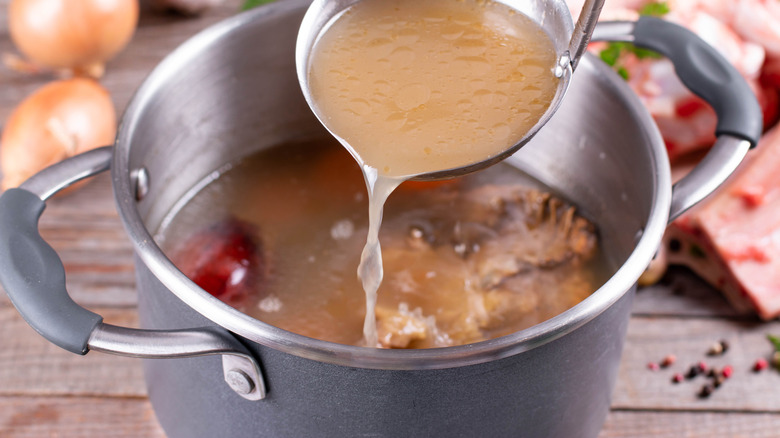Why Martha Stewart Says You Should Never Boil Stock
Own it — there's no reason to hide. Your rotisserie chicken dinner did indeed come from the grocery store. Could you have spent hours on end producing a superior product in your own kitchen? Maybe. But, who has time for that on the regular? Perhaps Martha Stewart, who would rather serve up something a touch more involved. In fact, Stewart not only has several different recipes for rotisserie chicken, but also has the perfect use for leftover bones: stock.
The actual process of making stock, no matter the protein source, takes a fair amount of time — approximately eight hours, Stewart explains in a clip from "Martha's Cooking School." As she makes a brown beef stock, she roasts the bones and aromatics for a deep color and flavor before adding vegetables and tomato paste. Once the water is added for a slow simmer, she warns against boiling the precious liquid as the high temperatures will yield a cloudy stock.
But don't just take Stewart's word for it. To understand why you should never boil stock, look no further than a law of physics you may or may not remember from high school science class.
Boiling temperatures affects stock
The science of flavor distraction harkens to 1855 when Adolph Fick explored the movement of molecules from higher concentrations to lower ones, per La Petit Noisette. Fick's law stated "that the rate of diffusion of a substance across unit area (such as a surface or membrane) is proportional to the concentration gradient," according to Science Direct. As the law applies to a quality stock, factors such as surface area, pressure, flavor concentration, and temperature play important roles, La Petit Noisette explains. And, when it comes to temperature, the higher the temperature, the faster flavor molecules will move. So, considering water boils at 100 degrees Celcius, or 212 degrees Fahrenheit, the bone fat quickly emulsifies into the agitated stock creating cloudy conditions.
While impurities and ingredient particles won't necessarily affect the taste of your stock, they're what makes stock cloudy, according to Kitchn. You can certainly strain them out like Stewart did in her video. But, unless you're making pot-au-feu or maybe consommé, cloudy stock won't hurt a thing. You can always use the less than perfect liquid for beef stew or chicken and dumplings.
Still, to have the clearest results, never boil your stock. As Stewart explains, "Boiling a stock is going to make a cloudy stock."

